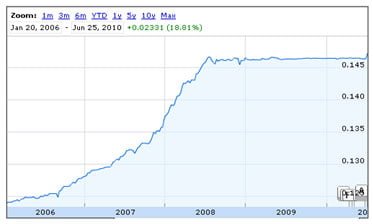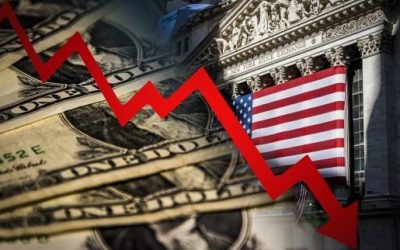
On June 19, 2010 China agreed to let their currency the Yuan (also known as the Renmimbi) once again float against the US dollar. For almost exactly 2 years the Chinese have held their currency to a fixed exchange rate with ours, but due to pressure from the US government China finally agreed to lift the peg. The US government got what they wanted, but perhaps they should be a little more careful what they wish for.

As you can see in the chart above, before the peg was established in July 2008, the Yuan was steadily appreciating against the dollar. Therefore, it is logical to assume that now that the peg has been lifted it will continue along its path of strengthening again.
What does this Mean for the Future of the US and Chinese Economies? A weak currency has its up side and down side. China keeping the Yuan artificially low was beneficial for exports because their goods were nice and cheap, but it was bad for those holding the Yuan because of its lack of purchasing power. Now that the Chinese have agreed to let the Yuan appreciate, the incentive to hold their currency goes up (both by the Chinese and those in foreign countries) but exports will suffer as a result. On the flip side, holders of US dollars (who should already be worried about their currency being devalued as it is) will now be even less likely to hold them as they watch their purchasing power begin to diminish even more rapidly. However, the US government encouraged the Chinese to lift the peg so that we can enjoy a higher demand for our exports. Some may ask “Is this really such a bad thing? This should help our economy get back on its feet, right?†Before we jump to that conclusion lets first look at the relationship we have with China.
Chinese Imports vs. American Exports. We import more goods from China than any other country. To test the truth of this, walk around your house and pick up as many random items as you can, turn them over and see where they were made. Whether its picture frames, nick nacks, clothing, shoes, coloring books, paper clips, dishes, furniture, etc. the highest percentage of goods in your home most likely come from factories in China. China, as a production based economy, has become a net exporter of goods (meaning that they have trade surpluses). We, on the other hand, import a whole lot more than we export to China and everywhere else. And since our currency enjoys world reserve status, we are able to run up massive trade deficits without any immediate consequences. In other words, China is basically the antithesis of the US in that, while we underproduce and overconsume, they have a culture of overproduction and underconsumption.
Peter Schiff recently opined on China’s currency move on CNBC recently: “We’ve received a huge subsidy, and still do, from the Chinese. That subsidy is now being withdrawn. I think people are going to be surprised by the magnitude and the speed with which the Renmimbi appreciates [against the dollar]. Initially it will be slow, but as the Chinese government begins to comprehend the benefit to their economy with a stronger Renmimbi, I think they will loosen the reigns… and for America that means higher prices.†He goes on to say how the free market will definitely take the Yuan much higher, if China lets it, and what that means for the US, “The [Chinese] currency needs to go up dramatically to reflect the true productivity of Chinese workers… this move is eventually going to pull the rug out from under our phony economy.â€
Will the Chinese Continue to Purchase US Treasuries? Schiff says “noâ€. Now that the dollar’s future is in question and the Yuan is on the rise again, where is the incentive for China to continue to lend to us? “The reason that China has been buying so many treasuries is because they had to recycle all the dollars that they purchased to prop up our currency and suppress their own. But as the Chinese let the Renmimbi appreciate they don’t have to buy as many treasuries. So we have to find somebody else [to create a demand for our debt] but there is nobody else.†says Schiff.
What if China Steps Out of the US Treasury Market? Two possibilities then lie before us: higher interest rates to lure new investors or the Federal Reserve will have to step in as the main buyer. Some say that the former is not even an option right now because of what higher rates will do to our economy, therefore the latter is the only immediate possibility. Eventually, a combination of the two is the most likely scenario. As the Fed becomes the main buyer of US debt (in other words, as we monetize our debt), inflation then kicks into high gear because we are basically just printing money at an incredible rate at that point. To try and curb this inflation, higher interest rates will soon follow. When this happens you should already be well positioned in commodities; mainly precious metals. When the rest of the world finally figures this out, the gold rush we will have will be unlike anything we have ever seen. Let not your heart be troubled. If you make the right moves now you will survive; maybe even thrive.
Bye for now, Schaef
The Schaef Report is an independent newsletter contributed to SHTFplan.com by Mr. A Schaef. You can receive the Schaef Report in your inbox. It’s Free! Subscribe below by providing your name and email address and you’ll be automatically added to the monthly distribution list. The Schaef Report and SHTFplan.com take your privacy very seriously and will not distribute or share your email address with other parties.
Error: Contact form not found.









Schaef, thanks for an excellent introduction to how the Yuan depeg will affect the US economy, trade and the dollar.
While our government will tout this as a victory for exports, the reality is that the dollar will actually suffer long-term, not just against the Yuan, but everything else as well.
In a previous article we published, we pointed out that Peter Schiff said “When China Pulls The Peg, Cardiac Arrest Will Follow.” This is likely what will happen.
We have no productive capacity right now, so there’s going to be a significant turn-around time before we actually start producing anything. The fact that consumers in the rest of the world is also broke is not going to help, either.
You hit the nail on the head with your assessment of US Treasuries. Tim Geithner will never discuss this with the US public.
If they let the Yuan freely float (which they’ve haven’t yet done), there will be no need for them to hold our Treasuries. Coupled with the fact that the Chinese know we’ll never make good on our debt, the longer-term outcome for the US Dollar is not good… I don’t foresee a dollar collapse anytime soon (though it is possible), we will eventually reap the whirlwind.
A 0.47% adjustment in the pegged rate of yuan to dollar just before the G20 meeting does not indicate a floating yuan. The Chinese have not unpegged their currency yet.
Baby steps, Roy. Schiff hit the nail on the head when he said “as the Chinese government begins to comprehend the benefit to their economy with a stronger Renmimbi, I think they will loosen the reigns”
The idea behind the currency adjustment is for China to become the consuming nation and economic engine that the USA has been: buying around the world, but mostly in China to develop China as a modern capitalistic economy. It was either that or eventual nuclear war between competing ideologies.
In leiu of nuclear war which serves no one, the US and Central Bankers everywhere agreed to make China a wealthy nation if they would become capitalists. Imagine the dollar signs in the eyes of the International Bankers as they salivated over the idea of one billion new consumers buying house, cars and trucks, etc: all of which would require LOANS! And of course, India added a billion more! What a great idea! So the wealth of America, the wealth of Americans, was systematically transferred to China with the blessings of Republicans and Democrats alike: elected representatives all.
So the Commies sent all of the kids from the Politbureo to Warton, Harvard, Oxford, Standford, etc to a get a capitalistic education while they sent observers to The City (London) for a couple of decades to master the art of capitalism. When everyone returned to Bejing, State assets were privatized with the children of the Communist Party leaders as the CEO’s of the new private companies. Now, the wealth is in China, communists are now capitalists, and their kids are multi-millioniares.
That goal has been achieved and now it is time to level the playing fields for Europe and the USA. By leveling the playing field, China will assume the role of consuming nation by buying with their stronger currency from the US and Europe, thus (theoretically) creating new job opportunities in both Regions. Europe has long had higher systemic levels of  unemployment, even more so than the US, as their jobs were also moved to China and India.
China will continue to buy US and European financial instruments with its excess reserves, but will not buy as much because their reserves will dwindle as their currency becomes stronger. They will continue to reinvest their excess reserves into major resources companies and the natural resources themselves, but at a diminishing rate.
The US will enter a period of sustain slow growth and higher unemployment with a dollar that has diminishing value. This diminishing value will make life difficult in the US for many and the concept of “full employment” may be “adjusted” to 6% from 16% to account for this new reality.
As the dollar plummets in purchasing power, the wealth of other nations, i.e. China, Russia, Saudi Arabia and India, will be drawn to buy and develop real assets in the US again: i.e. factories using “cheap” American labor.
The US government will by back its worthless securities from the new revenues it generates from higher taxes and from an expanding economy somewhere down the road. But by then it will be time for the one world currency that has already been designed and introduced by Russia at the G-8 meeting.
Some ratio of wealth will be assigned to precious metals that the major nations own, are buying, and will produce in the “Golden Age of Aquaris” that will eventually be imposed upon US. The only opposition to this scenario is the American electorate and Chinese workers who are demanding new rights and may riot if they lose enough jobs down the road.
So should we.